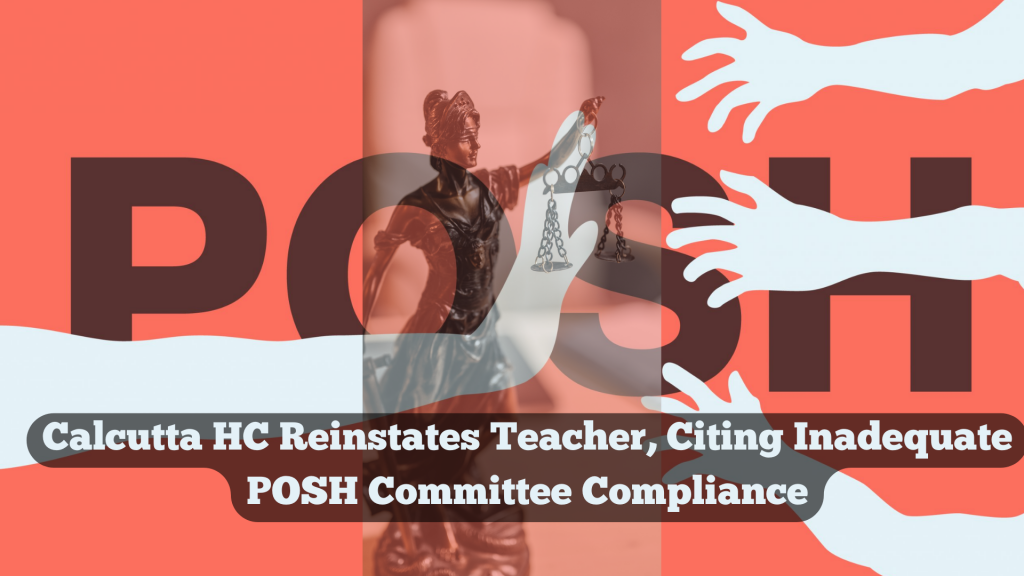
High Court Ruling Establishes Crucial Guidelines for Employers and ICC Members in Sexual Harassment Cases
Judgement Given On : 23/12/2015
Background
The High Court of Delhi, in the case of Linda Eastwood vs. Union of India and Ors., handed down a pivotal judgment on December 23, 2015. This case addresses a multitude of critical issues surrounding the formation of internal complaints committees (ICCs), the conduct of inquiries, and the preparation of inquiry reports under the 2013 Act pertaining to sexual harassment.
In this complex case, ‘X’ (“Petitioner”) initiated a writ petition before the High Court of Delhi under Article 226 of the Constitution of India, coupled with Section 482 of the Code of Criminal Procedure. The petitioner sought a court order directing her employer to act upon the findings recorded by the company’s ICC.
The circumstances of this case are intricate. The petitioner had been employed by M/S. Bridge & Roof Co. (India) Ltd., a government-owned enterprise under the Ministry of Heavy Industries & Public Enterprises, for a substantial 33-year tenure. She lodged a formal complaint of prolonged sexual harassment over a span of two years against Mr. M.K. Singh, a fellow employee. The complaint was submitted to the company’s ICC.
The ICC initiated an investigation into the matter and concluded that a prima facie case of sexual harassment existed. However, during the subsequent stages of inquiry, the respondent, Mr. M.K. Singh, repeatedly failed to participate, ultimately leading to the ICC issuing an ex-parte report. Significantly, on the day when this ex-parte decision was rendered, the complainant and two ICC members failed to attend the meeting. The resulting report, which found Mr. M.K. Singh guilty, was forwarded to the Ministry and the President of India for further action.
However, the respondent, now holding the additional role of Chairman and Managing Director (CMD), took an active role in reconstituting the ICC. This second ICC, this time with an altered composition, carried out a fresh inquiry. The external member of the new ICC had previously been absent on the day of the ex-parte decision by the first ICC. Two members of the newly constituted ICC had served as witnesses for the complainant during the proceedings of the first ICC. Another member of the new ICC had also been part of the first ICC but had chosen to abstain from participation on the day of the ex-parte decision. In contrast to his previous behavior, Mr. M.K. Singh promptly appeared before the new ICC, which subsequently absolved him of all charges, citing deficiencies in the previous ICC’s report.
The petitioner’s legal counsel argued for action against Mr. M.K. Singh based on the first ICC’s report. The opposing counsel countered this assertion, contending that the absence of signatures from all ICC members on the final report implied a lack of collective consent.
High Court Ruling and Guidelines for Employers and ICC Members
After carefully considering arguments from both parties and examining the facts of the case, the Delhi High Court issued the following significant guidelines for employers and ICC members:
- Mandatory Signatures on Inquiry Reports: An inquiry report must bear the signatures of all ICC members. The absence of such signatures raises doubts about the collective will of the ICC and the validity of the report.
- Flaws in ICC Composition: The findings recorded by the second ICC were invalidated due to several flaws in its composition, including its formation while the first ICC had already submitted its final report. The presence of members who had served as witnesses for the complainant during the first ICC’s investigations created a conflict of interest. Additionally, including members who had voluntarily refrained from participating during the first ICC’s decision undermined the integrity of the second ICC’s proceedings.
- Principles of Natural Justice: The High Court emphasized that principles of natural justice must be diligently adhered to during ICC proceedings. ICC members should ensure impartiality, independence, and absence of bias in their investigations. No injustice should be permitted.
In light of these findings, an agreement was reached between the involved parties to conduct a de novo inquiry by reconstituting the ICC once more. This time, the selection of the Presiding Officer and members was entrusted to the Court itself. The reconstituted ICC was directed to commence proceedings within ten days and submit its report in accordance with the timelines specified by the Act.
A Pivotal Legal Precedent
This case holds immense significance for both employers and ICC members, as it establishes fundamental principles to be observed when constituting ICCs and preparing inquiry reports. It underscores the critical importance of adhering to proper procedures and ensuring the fairness and impartiality of ICC proceedings. Moreover, it serves as a reminder of the responsibilities placed on employers to maintain an environment free from bias and conflict of interest.
In essence, the judgment reiterates the importance of upholding the principles of justice, particularly in matters as sensitive and consequential as those involving sexual harassment in the workplace. It underscores the need for transparency, impartiality, and collective responsibility when addressing such serious allegations.
